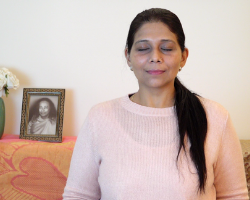“I don’t have time to meditate!” is the most common obstacle to meditation. Fortunately, meditation is one of those practices that give you the best return on time invested. Learn how to can tackle perpetual busyness to find time for your spiritual practices and become more efficient with the help of meditation.
So far in the 21st century, technology has made our lives easier in unprecedented ways. We can get food delivered to our doorstep, watch any movie we want, and talk to someone around the world – all through a little device in our pockets. And thanks to Alexa, we can do all of that without even lifting a finger.
Technology has enabled us to spend less time on mundane things and freed our energy for greater duties. Yet, isn’t it fascinating that even with all this, we still feel starved for time?
Tell me this: Do you feel like there’s not enough time in the day? That if only you had 36 or 48 hours, you can get all your work done?
Then you, my friend, know what “Time Famine” feels like. Put simply, it’s the feeling of not having enough time to do everything you want to do. You may not have known that this feeling has a name. But look around and you’ll find many souls afflicted with this “disease.”
Thus, we mistake perpetual busyness as a sign of productivity. We’ve forgotten that we’re human beings, not human doings.
Downtime in people’s life has decreased and the stress levels have increased to all-time highs. Why is it so? A common misconception is that our generation has a greater need for distraction than previous ones. But no, every generation has had its set of distractions.
Rather our predicament is worse because the tools we carry in our pockets make it easier to express distractive urges at an ever-increasing pace.
Studies also show that workers are spending more time on shallow, distractive tasks like replying to emails and messages while barely doing the work they’re being paid for.
Further, 2022 cell phone usage statistics show that we’re checking our phones 344 times a day. That’s once every four minutes!
It’s no surprise then why we feel stressed, anxious and out of time to get things done.
The Feeling of Time Famine
There are many reasons why we feel starved for time. Here are a few:
- FOMO (Fear Of Missing Out): Many people keep a tab open with their favourite social media platform or email inbox just in case there’s an important update. They keep updating their feed lest they miss out on something they want to see. This hurts our concentration and leads to perpetual anxiety.
- Blurry Boundaries: Most people (or companies) don’t set the right work boundaries. They let their work spill into every minute of the day and wonder why they feel overwhelmed.
- Habitual Distraction: Often the reason we’re so distracted is we’ve made distraction a habit. For instance, we’re addicted to checking our phones every five minutes, which makes the mind constantly restless.
- Anxiety To Get Things Done: I’ve often struggled with the urge to check off each item on my to-do list. It’s hard to leave something on the next day when you know you can do it today. Yet rushing to finish all our tasks haphazardly leads to nothing but stress.
Whatever the reason may be, time famine is not an objective reality, it’s a feeling. Meaning, that there is enough time in the day to get things done. It’s just that we feel there isn’t.
Circumstances, in other words, are neutral. It’s our reaction that makes them good or bad.
The main reason for having this feeling is how we perceive time itself. Our habits and state of consciousness determine how we perceive time. The good news is, that you can alter that perception to your benefit using meditation.
When We’re Starved for Time, Meditation Feeds Us
“The future is an imagined Now, a projection of the mind. When the future comes, it comes as the Now. When you think about the future, you do it now. Past and future obviously have no reality of their own. Just as the moon has no light of its own, but can only reflect the light of the sun, so are past and future only pale reflections of the light, power, and reality of the eternal present. Their reality is “borrowed” from the Now.”
— Eckhart Tolle
Realized yogis (and even a few scientific theories) tell us that time and space are delusions. Everything is happening in the Eternal Now. Since most of us aren’t at that level of realization yet, let’s take a simpler example to understand time perception.
Think about the last time you stood in a queue. Specifically, recall how you felt right before you pulled out your phone to kill time by checking email or social media.
Didn’t time seem to slow down? You were probably wondering why it’s taking so long. Perhaps you felt you’d been standing there for a long time but when you looked at your watch, only two minutes had passed. Feeling bored, you then found repose on your mobile screen.
How is it possible? Why does time “fly” quickly in certain situations and “slow down” in others?
The answer lies in your depth of awareness of the present moment. The more you slow down to focus on the present moment, the slower you perceive time to be. The greater your awareness of the present, the more your subjective perception of time is altered.
Every meditator has felt brief moments of timelessness in their practice. For some practitioners, time slows down, and for others, hours pass by without any effort. And research has now proven that this alteration of perception continues to stay with people, even when they come out of meditation! Researchers call this the difference between “self-duration” and “world-duration.”
By making you more focused on the present moment, meditation alters your perception of time. As a result, you can concentrate better and get things done quicker.
Takeaways
Meditate for 15 minutes. But if you don’t have time, meditate for 1 hour. – Zen saying
Meditation helps you to be more efficient and get things done faster than others. People who struggle at first to find time to meditate, are later surprised at how efficient their life becomes after establishing a daily practice of meditation.
Moreover, every time you sit to meditate, you’re subconsciously affirming time affluence. It’s like saying to your mind, “Hey, don’t worry. We have enough time to get things done.”
With consistent practice, this subconscious affirmation slowly turns into a belief. It takes away the feeling of not having enough time. Gradually, you’ll start to feel that time is abundant and that you have the power to accomplish anything you set your mind to.
Alongside daily meditation, here are some tips that can help avoid time famine:
- Take mindfulness breaks: Schedule alarms on your phone to remind you to take a moment off now and then to center yourself. You can take a walk, stretch, practice breathing exercises, etc to slow down and experience a sense of awe and wonder in the present moment.
- Don’t rush as you start the day: Most people start their days frantically, rushing from one task to the next. Every time you do this, it has an undesirable effect on your mind, priming it for restlessness throughout the day.
- Set boundaries: Treat your meditation times just like you would treat your doctor’s appointment or a conference call at work. Rajarsi Janakananda, a multi-millionaire businessman and Yogananda’s most advanced male disciple would set aside several hours in the morning for meditation. When asked about his whereabouts, he instructed his secretary to tell everyone that Rajarsi was in a meeting. What his colleagues didn’t know, however, was that he was in a meeting with God!
In the absence of clear boundaries and priorities, we waste our time on unproductive activities or tasks leaving us no time for meditation and introspection. Then we complain of not finding time to meditate. We must discipline the mind by prioritizing our inner peace and making time for meditation. - Do one thing at a time: Multitasking makes the mind restless. If we keep switching tasks rapidly, we lose our awareness of the present moment and are less efficient overall. Doing one thing at a time brings a sense of calmness, improves concentration and makes us more productive.
Time famine is real. And with the world moving faster than ever, more and more people struggle with it.
The only solution is to find and nurture your inner peace through meditation – with that “under your belt”, outside circumstances would cease to have a hold on you.
Paramhansa Yogananda told his disciples to be able to “stand unshaken amidst the crash of breaking worlds.” That’s the ideal we all should aspire towards.
If you’re looking for instructions and guidance in meditation, register for the upcoming Ananda course, “Learn to Meditate,” which teaches the basics of meditation and how to establish your practice. It is also the first step on the path of Kriya Yoga, which is an advanced pranayama technique popularized by Paramhansa Yogananda in the 20th century, as an effective tool for Self-realization. Joy to you!


2 Comments
Wonderful Shivendra. Very well written.
Thanks Shivendra for sharing this inspiring article on meditation. I am excited to implement learnings from the article to build my meditation practice. I loved this line – If you don’t have time meditate for 1 hour and otherwise for 15 mins.
Thanks